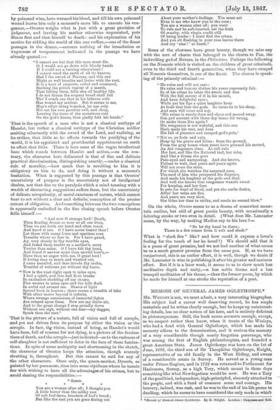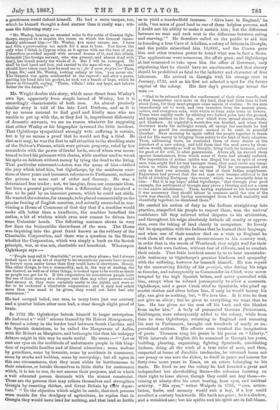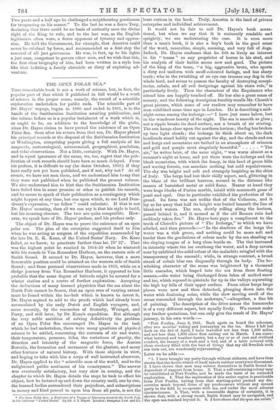MEMOIR OF GENERAL JAMES OGLETHORPE,* Mu. WEIGHT is not, we
must admit, a very interesting biographer. His subject had a career well deserving record, he has ample materials and he writes clearly enough, but he heaps up uninterest- ing details, has no clear notion of his hero, and is entirely deficient in picturesqueness. Still, the book seems accurate enough, except, as we suspect rather than know, when it treats of the Wesleys, who had a feud with General Oglethorpe, which has made his memory odious to the denomination, and it revives the memory of a very considerable though nearly forgotten personage, who was among the first of English philanthropists, and founded a great American State. James Oglethorpe was born on the let of June, 1689, the third son of Sir Theophilus Oglethorpe, Knight, representative of an old family in the West Riding, and owner of a considerable estate in Surrey. He served as a young man under Prince Eugene, and in 1722 was returned to Parliament for Haslemere, Surrey, as a high Tory, which meant in those days something like what Newdegatism would be now. He was a Tory of the goodkind, independent, high-principled, sincerely attached to the people, and with a fund of common sense and courage. His bravery, indeed, was rash, and he was to the end of his life prone to duelling, which he seems to have considered the only mode in which
*Memoir of General James 04gethorpe. By 11. Wright. London : Chapman and daIL a gentleman could defend himself. He had a stern temper, too, which he himself thought a deal sterner than it really was ; wit- ness the following story :— "Mr. Wesley, hearing an unusual noise in the cabin of General Ogle- thorpe, stepped in to inquire the cause, on which the General imme-
diately addressed him Mr. Wesley, you must excuse me. I have met with a provocation too much for a man to bear. You know, the only wine I drink is Cyprus wine, as it agrees with me the best of any. I therefore provided myself with several dozens of it, and this villain, Grimaldi [hie foreign servant, who was present, and almost dead with fear], has drunk nearly the whole of it. But I will be revenged. He shall be tied hand and foot, and carried to the man-of-war. The rascal should have taken care how housed me so ; for I never forgive.'—' Then, I hope, Sir,' said Mr. Wesley, looking calmly at him, you never sin.' The General was quite- confounded at the reproof ; and after a pause, putting his hand into his pocket, he took out a bunch of keys, which he threw at Grimaldi, saying, There, villain t take my keys, and behave better for the future."
Mr. Wright doubts this story, which came direct from Wesley's .own lips, apparently from simple hatred of Wesley, but it is exceedingly characteristic of both men. An almost precisely similar story is told of the late Lord Durham, and as it is by no means unusual to find good and kindly men who are unable to put up with the, as they feel it, impertinent dishonesty of domestic servants, we see no reason whatever for supposing that either Wesley or his biographer invented the little incident. That Oglethorpe sympathized strongly with suffering is certain, but is by no means a proof that he would not flog a thief. Be that as it may, he was the first to call attention to the shocking state of the Debtor's Prisons, which were private property, ruled by low scoundrels with the power of feudal lords, one of whom was accus- tomed to load his prisoners with chains, while another used to wreak his spite on debtors without money by tying the dead to the living. That particular miscreant—Acton was the name of him—bribed the jury which tried him, but Oglethorpe, by the assiduous exer- tions of three years and incessant references to Parliament, reduced the prisons to some sort of order and decency. He was a determined free trader ; not, we imagine, from our economic ideas, but from a general perception that a differential duty involved a fine to be paid by an innocent person, which he could not abide. He wanted the colonies, for example, to be placed commercially on the precise footing of English counties, and actually succeeded in con- vincing a House of Commons of that day that if a machine would snake silk better than a handloom, the machine benefited the nation, a bit of wisddm which even now cannot be driven into some Unionists' heads. The following sentence shows in very few lines the businesslike shrewdness of the man. The House was inquiring into the great fraud known as the robbery of the Charitable Corporation, and there was a question in the House whether the Corporation, which was simply a bank on the Scotch principle, was, or was not, charitable and beneficial. Whereupon Oglethorpe says :- "' People may call it " charitable," or not, as they please ; but I always looked upon it as an act of charity to let necessitous persons have money to borrow upon easier terms than they could have it elsewhere. Money, like other things, is but a commodity, and, in the way of dealing, the use thereof, as well as of other things, is looked upon to be worth as much as people can get for it. If this corporation let necessitous people have the use of their money at a cheaper rate than any other persons would lend money at, they were certainly useful to the public, and were so far to be reckoned a charitable corporation; and if they had asked more than was usual to be given, they would not have had any customers.' "
He had escaped belief, one sees, in usury laws just one century and a quarter before other men had, a clear though slight proof of brain.
In 1732 Mr. Oglethorpe betook himself to larger enterprises. He had read a " wild " scheme framed by. Sir Robert Montgomery, to found a colony in the border land between South Carolina and the Spanish dominions, to be called the M.argravate of Azilia, with Sir Robert as Margrave, and bethought him that his unhappy debtors might in this way be made useful. He wrote :—" Let us cast our eyes on the multitude of unfortunate people in this king- dom of reputable families and of liberal education ; some uudone by guardians, some by lawsuits, some by accidents in commerce, some by stocks and bubbles, some by suretyship ; but all agree in this one circumstance, that they must either be burthensome to their relations, or betake themselves to little shifts for sustenance which, it is ten to one, do not answer their purposes, and to which a well educated person descends with the utmost constraint. These are the persons that may relieve themselves and strengthen Georgia by resorting thither, and Great Britain by tlftsir depar- ture." " To the objection which might be made, that such persons were unable for the drudgery of agriculture, he replies that in Georgia they would have land for nothing, and that land so fertile
as to yield a hundredfold increase. ' Give here in England,' he adds, ten acres of good land to one of these helpless persons, and I doubt not his ability to make it sustain him ; but the difference between no rent and rack rent is the difference between eating and starving." He therefore called on the public to aid him in founding a true Cave of Adullam, a colony of debtors in Georgia, and the public subscribed him 10,0001., and the Crown gave him and other trustees power to found what was in fact a State. The applications were numerous, the affair grew, and Oglethorpe at last consented to take upon him the office of Governor, only stipulating that he should have no emoluments, and that slavery should be prohibited as fatal to the industry and character of free labourers. He arrived in Georgia with his strange crew in January, 1733, and as his first act selected a spot for the future capital of the colony. His first day's proceedings reveal the man :—
" Glad to be released from the confinement of their close vessels, and to find themselves once more on dry land, they had little time to look about them, for they must prepare some means of shelter. So the men immediately set to work, and tore branches from the nearest pines, cedars, and evergreen oaks, with which to form rude tents or bowers. These were rapidly made by sticking two forked poles into the ground, and laying another on the top, over which were spread sheets, cloaks, and blankets. At nightfall a watch-fire was kindled, and when their Governor made his midnight round, all except the sentinels he had posted to guard the encampment seemed to be sunk in peaceful slumber. Next morning he again called the people together to thank God for His mercy in bringing them safely to the land of their adoption. Then, addressing them, he reminded them of their duties as the founders of a new colony, and told them that the seed sown by them- selves world; morally as well as literally, bring forth its increase, either for good or for evil, in after generations. Above all, he warned them against drunkenness, from which some of them had already suffered. The importation of ardent spirits was illegal, but as, in spite of every care, rum might find its way amongst them, they must resist any temp- tation to which they might be exposed. This he recommended not only on their own account, but on that of their Indian neighbours. Experience had proved that the red man soon became addicted to the habit of drinking European ' fire-water,' which was invariably fatal to But it is my hope,' added Oglethorpe, 'that through your good example, the settlement of Georgia may prove a blessing and not a curse to the native inhabitants.' Then, having explained to his hearers that it was necessary they should labour in common until the site of the town was cleared, and having encouraged them to work amicably and cheerfully together, he dismissed them."
He carried his notion of duty to the Indians straightway into practice, compelled his people to respect them, won the natives' confidence till they referred tribal disputes to his arbitration, and throughout his reign absolutely forbade all cruelty or oppres- sion, even the taking of land clearly in occupation. So keenly did he sympathize with the Indians that he learned their language, and when one of their number died on a visit to England he took them all down at great inconvenience to his country seat, in order that in the woods of Westbrook they might wail for their dead in their own fashion, without fear of ridicule, and so comfort their minds. That little incident seems to us to bear unmistake- able testimony to Oglethorpe's genuine kindness and sympathy with the suffering, however far beneath himself. He was repaid by the unswerving fidelity of his protégé; who during his reign as founder, and subsequently as Commander-in-Chief, were never tempted by the high Spanish bribes, and never quarrelled with him, except when he refused peremptorily to allow a massacre. Oglethorpe, said a great Creek chief to Spaniards, who piled' up scarlet clothes and silver before him, if only he would betray his ally, can give us nothing, but, " We love him. It is true he does not give us silver ; .but he gives us everything we want that he has. He has given me the coat off his back and the blanket from under him." A body of persecuted German Protestants, Salzburgers, were subsequently added to the colony, while from time to time Oglethorpe, returning to England and resuming his seat in Parliament, brought out hundreds of needy or im- poverished settlers. His efforts even toughed the imagination of poets. Thomson sang his praise in his poems on " Liberty." With intervals of English life he remained in Georgia ten years, building, planting, organizing, fighting Spaniards, conciliating Indians, doing all the work of a true ruler of men, and then, suspected at home of Jacobite tendencies, he returned home not one penny or one acre the richer, to dwell in peace and honour for forty-two more years in Essex, on an estate belonging to his uncle. He lived to see the colony he had founded a great and independent but slaveholding State—the colonists insisting on their right to lease slaves, though they could not buy them—re- taining at ninety-five his erect bearing, keen eyes, and habitual activity. "His eyes," writes Walpole in 1785, "ears, articu- lation, limbs, and memory would suit a boy, if a boy could recollect a century backwards. His teeth are gone ; he is a shadow, and a wrinkled one; but his spirits and his spirit are in full bloom. Two years and a half ago he challenged a neighbouring gentleman for trespassing on his manor." To the last he was a fierce Tory, declaring that there could be no basis of authority save the divine right of the King to rule, and to the last was, as the English legitimists often were, a fierce opponent of tyranny and oppres- sion. He told the Government, for example, that America could never be subdued by force, and recommended as a first step the removal of all just grievances. He was, in fact, up to his lights a just man, competent to govern other men, and we wish that this, the first clear biography of him, had been written in a style less like that befitting a family chronicle or diary of exploring ad- venture.
































 Previous page
Previous page